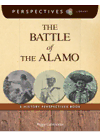
The Battle of the Alamo. A History Perspectives Book PDF
Preview The Battle of the Alamo. A History Perspectives Book
Page intentionally blank THE BATTLE of ALAMO THE A H I S T O R Y P E R S P E C T I V E S B O O K Peggy Caravantes Published in the United States of America by Cherry Lake Publishing Ann Arbor, Michigan www.cherrylakepublishing.com Consultants: Charles David Grear, PhD, Associate Professor of History, Prairie View A&M University; Marla Conn, ReadAbility, Inc. Editorial direction: Red Line Editorial Book design and illustration: Sleeping Bear Press Photo Credits: Percy Moran/Library of Congress, cover (left), 1 (left), 4; Bain News Service/Library of Congress, cover (middle), 1 (middle), 16; Library of Congress, cover (right), 1 (right), 24; North Wind/North Wind Picture Archives, 7, 9, 18, 20, 23, 30; C. Stuart/Library of Congress, 13; Rose West Photo/Shutterstock Images, 26 Copyright ©2014 by Cherry Lake Publishing All rights reserved. No part of this book may be reproduced or utilized in any form or by any means without written permission from the publisher. Library of Congress Cataloging-in-Publication Data Caravantes, Peggy, 1935- The Battle of the Alamo / Peggy Caravantes. pages cm. -- (Perspectives library) ISBN 978-1-62431-664-7 (hardcover) -- ISBN 978-1-62431-691-3 (pbk.) -- ISBN 978-1-62431-718-7 (pdf) -- ISBN 978-1-62431-745-3 (hosted ebook) 1. Alamo (San Antonio, Tex.)--Siege, 1836--Juvenile literature. I. Title. F390.C27 2013 976.4’03--dc23 2013029375 Cherry Lake Publishing would like to acknowledge the work of The Partnership for 21st Century Skills. Please visit www.p21.org for more information. Printed in the United States of America Corporate Graphics Inc. January 2014 Table of Contents In this book, you will read about the Battle of the Alamo from three perspectives. Each perspective is based on real things that happened to real people who were involved in or experienced the battle. As you’ll see, the same event can look different depending on one’s point of view. Chapter 1 4 ..................................................... Peter.Evans:.Texan.Commander Chapter 2 16 .................................................. Manuel.Vela:.Mexican.Soldier Chapter 3 24 .................................................. Ned:.Surviving.Slave Look, Look Again 30 ......................................... Glossary 31 ..................................................... Learn More 31 .................................................. Index 32 ............................................................ About the Author 32 ..................................... 1 Peter Evans Texan Commander I am a captain in the Texan army and one of the commanders at the Alamo in San Antonio, Texas. The Alamo was originally a mission built in the early 1700s. The missionaries there brought Christianity to the Native Americans. Now it serves as a fort for our Texan army in the Texas Revolution. Today is March 6, 1836, and we have been fighting the Mexicans here at the Alamo for 13 days. 4 The Texas Revolution can trace its roots back to 1824. That year, the territory of Texas became a Mexican state. Most of Texas consisted of American settlers living here on land grants from the Mexican government. We were content to live under Mexico’s rules until Antonio López de Santa Anna became Mexico’s president in 1833. He ignored his country’s constitution and made new laws of his own. Mexican states were losing their power, and we were losing our say in the government. This angered us. We were also far away from Mexico City, where the Second source government was located. We Find a second source that decided to rebel by trying to break discusses the reasons behind the Texas away from Mexico. On October 2, Revolution. Compare the 1835, shots were fired between information in that source Mexican soldiers and the people to what you read here. of Gonzales, Texas. This was the start of the Texas Revolution. 5 In late 1835, Santa Anna sent General Martín Perfecto de Cós to stop our rebellion. On December 5, Cós’s army clashed with a group of 400 Texans here in San Antonio. At that time, the Mexican soldiers had control of the Alamo. Cós turned the Alamo into a fort by placing 21 cannons at the site. The Mexican soldiers fought our army from behind its walls. But we won. Then we moved into the Alamo. We were hoping we could protect San Antonio from within its walls. We needed to make sure the Mexicans did not take control of the city. It is an important stop on the road that connects eastern and southern Texas. After we defeated General Cós, we tried to create a stronger defense at the mission. Colonel James C. Neill was put in charge of the Alamo’s defense. We took stock of the area. The Alamo was a three-acre complex with a large open square in its center. Limestone walls about eight feet tall and four feet thick surrounded the complex. On the north and 6 west sides, small buildings on the inside braced the outer walls. A low barracks supported the southern wall. On the east side was a two-story structure called the Long Barrack. About 50 yards from that building was the chapel, and at the back was the horse corral. The Alamo served as a mission before it became a Texan army fort. 7 Our first task was to brace the walls damaged in our battle with General Cós. We were piling hills of dirt to mount our cannons on when Colonel James Bowie arrived on January 19, 1836. He carried orders from Major General Sam Houston of the Texan army to destroy the Alamo. After all our hard work, the news shocked us. General Houston knew the Alamo was a weak defense. He thought we should retreat to Gonzales, which was roughly 70 miles east. It was easier to protect than the Alamo and San Antonio. Plus, it could serve as an alternate trade route. If we left, we would have to abandon our heavy weapons. Houston did not want us to leave arms for the enemy. His solution was to blow up the whole mission. Colonel Neill wanted to stay at the Alamo. He convinced Colonel Bowie that protecting San Antonio was critical. We could stop Santa Anna at San Antonio if he decided to march toward Texas’s 8
